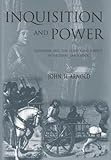Inquisition and Power : Catharism and the Confessing Subject in Medieval Languedoc / John H. Arnold.
Material type: TextSeries: The Middle Ages SeriesPublisher: Philadelphia : University of Pennsylvania Press, [2013]Copyright date: ©2001Description: 1 online resource (328 p.)Content type:
TextSeries: The Middle Ages SeriesPublisher: Philadelphia : University of Pennsylvania Press, [2013]Copyright date: ©2001Description: 1 online resource (328 p.)Content type: - 9780812236187
- 9780812201161
- 272/.2/09448 21
- BX1720 .A76 2001eb
- online - DeGruyter
- Issued also in print.
| Item type | Current library | Call number | URL | Status | Notes | Barcode | |
|---|---|---|---|---|---|---|---|
 eBook
eBook
|
Biblioteca "Angelicum" Pont. Univ. S.Tommaso d'Aquino Nuvola online | online - DeGruyter (Browse shelf(Opens below)) | Online access | Not for loan (Accesso limitato) | Accesso per gli utenti autorizzati / Access for authorized users | (dgr)9780812201161 |
Browsing Biblioteca "Angelicum" Pont. Univ. S.Tommaso d'Aquino shelves, Shelving location: Nuvola online Close shelf browser (Hides shelf browser)

|

|

|

|

|

|

|
||
| online - DeGruyter The Capture of Constantinople : The "Hystoria Constantinopolitana" of Gunther of Pairis / | online - DeGruyter Human Rights in Turkey / | online - DeGruyter Masking Terror : How Women Contain Violence in Southern Sri Lanka / | online - DeGruyter Inquisition and Power : Catharism and the Confessing Subject in Medieval Languedoc / | online - DeGruyter Legendary Hawai'i and the Politics of Place : Tradition, Translation, and Tourism / | online - DeGruyter The Saving Lie : Truth and Method in the Social Sciences / | online - DeGruyter The Penn Commentary on Piers Plowman. Volume 5, The Penn Commentary on Piers Plowman, Volume 5 ; C Passūs 2-22; B Passūs 18-2 / |
Frontmatter -- Contents -- Note on Texts and Translations -- Introduction -- PART I -- 1. The Lump and the Leaven -- 2. To Correct the Guilty Life -- 3. The Construction of the Confessing Subject -- PART II -- Introduction to Part -- 4. Questions of Belief -- 5. Sex, Lies, and Telling Stories -- Conclusion -- Abbreviations -- Notes -- Bibliography -- Index -- Acknowledgments
restricted access online access with authorization star
http://purl.org/coar/access_right/c_16ec
What should historians do with the words of the dead? Inquisition and Power reformulates the historiography of heresy and the inquisition by focusing on depositions taken from the Cathars, a religious sect that opposed the Catholic church and took root in southern France during the twelfth century. Despite the fact that these depositions were spoken in the vernacular, but recorded in Latin in the third person and rewritten in the past tense, historians have often taken these accounts as verbatim transcriptions of personal testimony. This belief has prompted some historians, including E. Le Roy Ladurie, to go so far as to retranslate the testimonies into the first-person. These testimonies have been a long source of controversy for historians and scholars of the Middle Ages.Arnold enters current theoretical debates about subjectivity and the nature of power to develop reading strategies that will permit a more nuanced reinterpretation of these documents of interrogation. Rather than seeking to recover the true voice of the Cathars from behind the inquisitor's framework, this book shows how the historian is better served by analyzing texts as sites of competing discourses that construct and position a variety of subjectivities. In this critically informed history, Arnold suggests that what we do with the voices of history in fact has as much to do with ourselves as with those we seek to 'rescue' from the silences of past.
Issued also in print.
Mode of access: Internet via World Wide Web.
In English.
Description based on online resource; title from PDF title page (publisher's Web site, viewed 24. Apr 2022)


